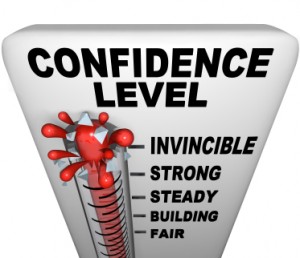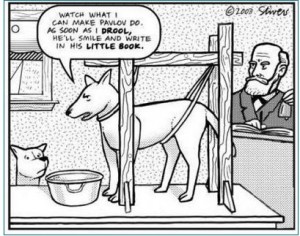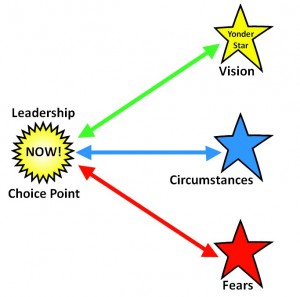 Note: Dwight is currently out on leave so we are running some “best of” blog posts from his writing for the Vistage Executive Street blog that you may not have seen before. Enjoy!
Note: Dwight is currently out on leave so we are running some “best of” blog posts from his writing for the Vistage Executive Street blog that you may not have seen before. Enjoy!
Culturally, we are in a hurry, particularly in business. There is a huge driving force for results, for achievements, for action. Often just being busy looks like success. It’s gotten to the point that, as researcher Brene Brown says, “exhaustion has become a status symbol.”
The problem is new research is emerging and it looks like all this multi-tasking, fragmented attention and “busy, busy, busy” isn’t actually healthy or the recipe for success. Being in a constant state of reacting to “incoming” and jumping to respond to everything that comes your way is not leadership and constantly driving people and yourself relentlessly forward is not necessarily great leadership either.
We want to remind you of “the power of the pause.” This is a step that can be made anytime, anywhere and requires no special tools or equipment. Being able to stop yourself, gather your energy and breathe is actually an incredibly powerful and masterful leadership move that is deceptively simple.
We aren’t talking about shutting down, withdrawing, hiding or freezing. We are talking about returning to your center and a place of balance. We are talking about allowing yourself to exhale fully, (since at the pace most of us go we are halfway holding our breath), and just being thoughtful and reflective for a minute or two.
If you doubt the power of this consider the interview Oprah Winfrey did with Sheryl Sandberg of Facebook. (Click here to view.) Apparently she has a policy at her company for twice per day mandatory meditation time. As she says in the interview, many people are overwhelmed by the idea of meditation so she asks that they at least unplug, and take quiet time for reflection. Whether or not you are an Oprah fan or consumer of her programs and magazines is not really important here. She is one of the most successful entrepreneurs in the US and has been so for many years. It is of note that someone who has built such an empire puts so much value on reflection and quiet time that she has made it a mandatory workplace policy.
We know of one coaching client that was so overwhelmed at the idea of any stillness, quiet or reflection that he wanted to flee the building just considering it. He finally agreed to set the alarm on his watch for 1 minute each hour to stop, breathe and just slow down. After committing to this practice he absolutely loved it and was able to create specific segments of time to gather his energy and pause.
So we ask you to consider incorporating “the pause” into your repertoire. Even just a couple of minutes per day has value. You might be surprised how changing your pace creates new avenues for creativity, intelligence and other positives to emerge.






 As you can imagine, with the Olympics in London, business leaders in the UK were very concerned about the impact of the Games on their businesses from a variety of standpoints. Employee engagement was a big issue. Would there be traffic problems that made it difficult for employees to get to work, particularly in London? And most importantly, would workers be distracted by the Games and find ways to “skive?” (British slang for evading work).
The Institute of Leadership and Management based in London has released a
As you can imagine, with the Olympics in London, business leaders in the UK were very concerned about the impact of the Games on their businesses from a variety of standpoints. Employee engagement was a big issue. Would there be traffic problems that made it difficult for employees to get to work, particularly in London? And most importantly, would workers be distracted by the Games and find ways to “skive?” (British slang for evading work).
The Institute of Leadership and Management based in London has released a 
 During a recent conversation with one of our CEO clients, I saw more deeply into something that I’ve been puzzling about for a long time that was both helpful and a bit entertaining for him. My puzzle has been ‘what makes it so hard for most of us to fully articulate and then share our real dreams with those around us? ‘
What came clear out of our conversation is that there is great personal risk in fully speaking a dream, even to yourself. Our histories, (which we fondly refer to metaphorically at 2130 Partners as “File Cabinets”), have lots of evidence stored in them about things that haven’t turned out, limiting beliefs, and circumstances that will prevent success. These “historical files” may well be aggregated under the section tab called “Impossible.”
During a recent conversation with one of our CEO clients, I saw more deeply into something that I’ve been puzzling about for a long time that was both helpful and a bit entertaining for him. My puzzle has been ‘what makes it so hard for most of us to fully articulate and then share our real dreams with those around us? ‘
What came clear out of our conversation is that there is great personal risk in fully speaking a dream, even to yourself. Our histories, (which we fondly refer to metaphorically at 2130 Partners as “File Cabinets”), have lots of evidence stored in them about things that haven’t turned out, limiting beliefs, and circumstances that will prevent success. These “historical files” may well be aggregated under the section tab called “Impossible.” In a workshop the other day, 2130 Partners’ co-founder, Suzanne Frindt, (who is also my wife), usedthe term “Lazy Labels” to capture the instant, automatic, and unexamined statements many, if not all of us make on a fairly regular basis. These statements could also be called “knee jerk reactions.” In this highly charged season of political sound-bites, such Lazy Labels seem to be flying everywhere! What we notice about “Lazy Labels” is that they seem to be a convenient way to suppress complex topics you don’t actually understand, don’t want to examine, or have “already made up your mind about.” The issue with this is that their use diminishes your effectiveness as a vision-focused leader. Let me explain.
Lazy Labels often have the effect of “shutting things down” like diagloue and conversations. If you stop dialogue, healthy inquiry, and curiosity-based listening with one of those quick labels/statements, you and those around you, will never learn more about each others’ knowledge, perspectives and feelings. In fact your brain has a mechanism to be sure you don’t learn anything that disagrees with your Lazy Label. You won’t be learning anything new about the subject at all. You will only see evidence that agrees with you. As we have written about often, we believe this is the era of collaborative leadership. We need each other’s skills, competencies, knowledge and perspective now more than ever, so shutting yourself and/or your team members down is dangerous.
In a workshop the other day, 2130 Partners’ co-founder, Suzanne Frindt, (who is also my wife), usedthe term “Lazy Labels” to capture the instant, automatic, and unexamined statements many, if not all of us make on a fairly regular basis. These statements could also be called “knee jerk reactions.” In this highly charged season of political sound-bites, such Lazy Labels seem to be flying everywhere! What we notice about “Lazy Labels” is that they seem to be a convenient way to suppress complex topics you don’t actually understand, don’t want to examine, or have “already made up your mind about.” The issue with this is that their use diminishes your effectiveness as a vision-focused leader. Let me explain.
Lazy Labels often have the effect of “shutting things down” like diagloue and conversations. If you stop dialogue, healthy inquiry, and curiosity-based listening with one of those quick labels/statements, you and those around you, will never learn more about each others’ knowledge, perspectives and feelings. In fact your brain has a mechanism to be sure you don’t learn anything that disagrees with your Lazy Label. You won’t be learning anything new about the subject at all. You will only see evidence that agrees with you. As we have written about often, we believe this is the era of collaborative leadership. We need each other’s skills, competencies, knowledge and perspective now more than ever, so shutting yourself and/or your team members down is dangerous.
 In the 1920s Ivan Pavlov conducted a series of very famous experiments in which he taught dogs to salivate at the ringing of a bell. If PDAs had been invented, he could have taught the dog to salivate when his cell phone received a call, email or text. He might have even taught the dog to bark so he would never miss an “incoming!”
In the 1920s Ivan Pavlov conducted a series of very famous experiments in which he taught dogs to salivate at the ringing of a bell. If PDAs had been invented, he could have taught the dog to salivate when his cell phone received a call, email or text. He might have even taught the dog to bark so he would never miss an “incoming!”



 As we discuss comfort zones, set points, etc. we want to be clear that this is not a piece about people who plod along and move slowly or people who seem risk averse. If you are a fast-paced, “go go go” type of person that is your comfort zone. What if you had to slow down, be more reflective, bring your energy “down and in” instead of being an “up and out” kind of person? What if you had to take on a meditation practice? Would you still be in your comfort zone? What if you are a thrill seeker and look for ways to “push the envelope” all the time? What would happen if you lived a more mundane existence and had to experience the ordinary? Would you still be in your comfort zone?
As we discuss comfort zones, set points, etc. we want to be clear that this is not a piece about people who plod along and move slowly or people who seem risk averse. If you are a fast-paced, “go go go” type of person that is your comfort zone. What if you had to slow down, be more reflective, bring your energy “down and in” instead of being an “up and out” kind of person? What if you had to take on a meditation practice? Would you still be in your comfort zone? What if you are a thrill seeker and look for ways to “push the envelope” all the time? What would happen if you lived a more mundane existence and had to experience the ordinary? Would you still be in your comfort zone?

 Many business owners, entrepreneurs, and professionals are “visionaries” – independent minded self-starters with lots of creativity and ideas. They often have a deep belief and confidence in their own point-of-view. If you are one of these people and have been successful, these traits have served you well. The challenge is that, at some point, to increase your level of productivity and success, it will take a team around you.
“My Team Are My Hands and Feet.” – Do you hire people as extensions of yourself? Meaning, you want them to just execute what you have in mind without questions - just to be an “extra pair of hands and feet.” If you have not developed the ability to clearly articulate your vision and goals in a way that is inclusive, everyone else is left wondering and waiting for you next set of instructions. This reinforces your sense of “I should just do it myself,” or, “if I could just do it myself.”
Many business owners, entrepreneurs, and professionals are “visionaries” – independent minded self-starters with lots of creativity and ideas. They often have a deep belief and confidence in their own point-of-view. If you are one of these people and have been successful, these traits have served you well. The challenge is that, at some point, to increase your level of productivity and success, it will take a team around you.
“My Team Are My Hands and Feet.” – Do you hire people as extensions of yourself? Meaning, you want them to just execute what you have in mind without questions - just to be an “extra pair of hands and feet.” If you have not developed the ability to clearly articulate your vision and goals in a way that is inclusive, everyone else is left wondering and waiting for you next set of instructions. This reinforces your sense of “I should just do it myself,” or, “if I could just do it myself.” “What Are You Really Good At?” – No matter how gifted, talented, and intelligent you are, you still have a “zone of excellence,” (as author Gay Hendricks would say), and zones of competence and incompetence. Your highest and best use is your zone of excellence.
“What Are You Really Good At?” – No matter how gifted, talented, and intelligent you are, you still have a “zone of excellence,” (as author Gay Hendricks would say), and zones of competence and incompetence. Your highest and best use is your zone of excellence. In the process of growing up and becoming a successful leader, you most likely put together a set of well-developed values, beliefs, experiences, and capacities. You have probably done well at suppressing your emotions and demonstrating your rational thinking. Being successful means your mix has served you well; you have been rewarded, “bonused,” and encouraged along the way. You have probably learned to rely on the way you interact, solve problems, and produce results to the point where the basis of your thinking, (your “paradigm”), is now instant, automatic, and unexamined.
To paraphrase the
In the process of growing up and becoming a successful leader, you most likely put together a set of well-developed values, beliefs, experiences, and capacities. You have probably done well at suppressing your emotions and demonstrating your rational thinking. Being successful means your mix has served you well; you have been rewarded, “bonused,” and encouraged along the way. You have probably learned to rely on the way you interact, solve problems, and produce results to the point where the basis of your thinking, (your “paradigm”), is now instant, automatic, and unexamined.
To paraphrase the  leadership,” and that means the Peter Principle is “in effect.” To continue to lead successfully, you will be required to think in new ways and benefit from the thoughts and perspectives of others. In other words, cherished self-reliance becomes obsolete. Collaboration, inclusion, openness, the ability to continue learning, respect of others’ skills, expecting others to contribute - these are the traits that are critical to develop.
leadership,” and that means the Peter Principle is “in effect.” To continue to lead successfully, you will be required to think in new ways and benefit from the thoughts and perspectives of others. In other words, cherished self-reliance becomes obsolete. Collaboration, inclusion, openness, the ability to continue learning, respect of others’ skills, expecting others to contribute - these are the traits that are critical to develop. This may seem like a funny question, but do you know the answer? Are you using all of your intelligence? We don’t mean “business intelligence” in the sense of consumer data, research and business results. We are talking about your own personal intelligence. You probably believe you “give it your all” and use all of your capacities and capabilities – but are you sure?
This may seem like a funny question, but do you know the answer? Are you using all of your intelligence? We don’t mean “business intelligence” in the sense of consumer data, research and business results. We are talking about your own personal intelligence. You probably believe you “give it your all” and use all of your capacities and capabilities – but are you sure?
 We can all think of examples of stories where people followed a gut instinct and it was either critical to their survival, or it changed their life, or drove them to make an important business decision. When people are tuned in to that gut information, and they are asked how they knew something or why they did what they did, the response they give is, “I just knew,” and we can tell by the emphasis that the knowing came from a deep and solid place. Being able to tap into our deep-seated inner knowing is something fundamentally human that our culture does not overtly value highly.
We can all think of examples of stories where people followed a gut instinct and it was either critical to their survival, or it changed their life, or drove them to make an important business decision. When people are tuned in to that gut information, and they are asked how they knew something or why they did what they did, the response they give is, “I just knew,” and we can tell by the emphasis that the knowing came from a deep and solid place. Being able to tap into our deep-seated inner knowing is something fundamentally human that our culture does not overtly value highly. (This post is an edited version of an article by Suzanne Mayo Frindt. To get the complete text
(This post is an edited version of an article by Suzanne Mayo Frindt. To get the complete text  How Can We Develop a Learning Culture?
There are many books and articles about learning organizations including work by Senge
How Can We Develop a Learning Culture?
There are many books and articles about learning organizations including work by Senge In
In  If you take this on and find yourself uncomfortable, make note of what your mind is saying is going to happen to you or how your internal dialogue is criticizing you. Use your self-awareness skills and you will likely find what’s stopping you is a limiting belief. Once identified, you can go to work on letting go of it. Check out
If you take this on and find yourself uncomfortable, make note of what your mind is saying is going to happen to you or how your internal dialogue is criticizing you. Use your self-awareness skills and you will likely find what’s stopping you is a limiting belief. Once identified, you can go to work on letting go of it. Check out 
 Fast forward back to today with this historical perspective and we can see that everything we take for granted as we do business today was originally invented by someone to facilitate trade, which in turn was driven by thousands of entrepreneurs in all regions where they were allowed to operate and were not taxed out of existence. Modern management is just a relatively late development to solve the “recent” problems of large operations scattered over great geographic areas and allow them to continue to facilitate trade and lower its cost. Much of the value of that management has been in gathering, organizing, and dispensing information needed by large numbers of people in far-flung operations to get their work done and make the transactions happen.
Fast forward back to today with this historical perspective and we can see that everything we take for granted as we do business today was originally invented by someone to facilitate trade, which in turn was driven by thousands of entrepreneurs in all regions where they were allowed to operate and were not taxed out of existence. Modern management is just a relatively late development to solve the “recent” problems of large operations scattered over great geographic areas and allow them to continue to facilitate trade and lower its cost. Much of the value of that management has been in gathering, organizing, and dispensing information needed by large numbers of people in far-flung operations to get their work done and make the transactions happen.